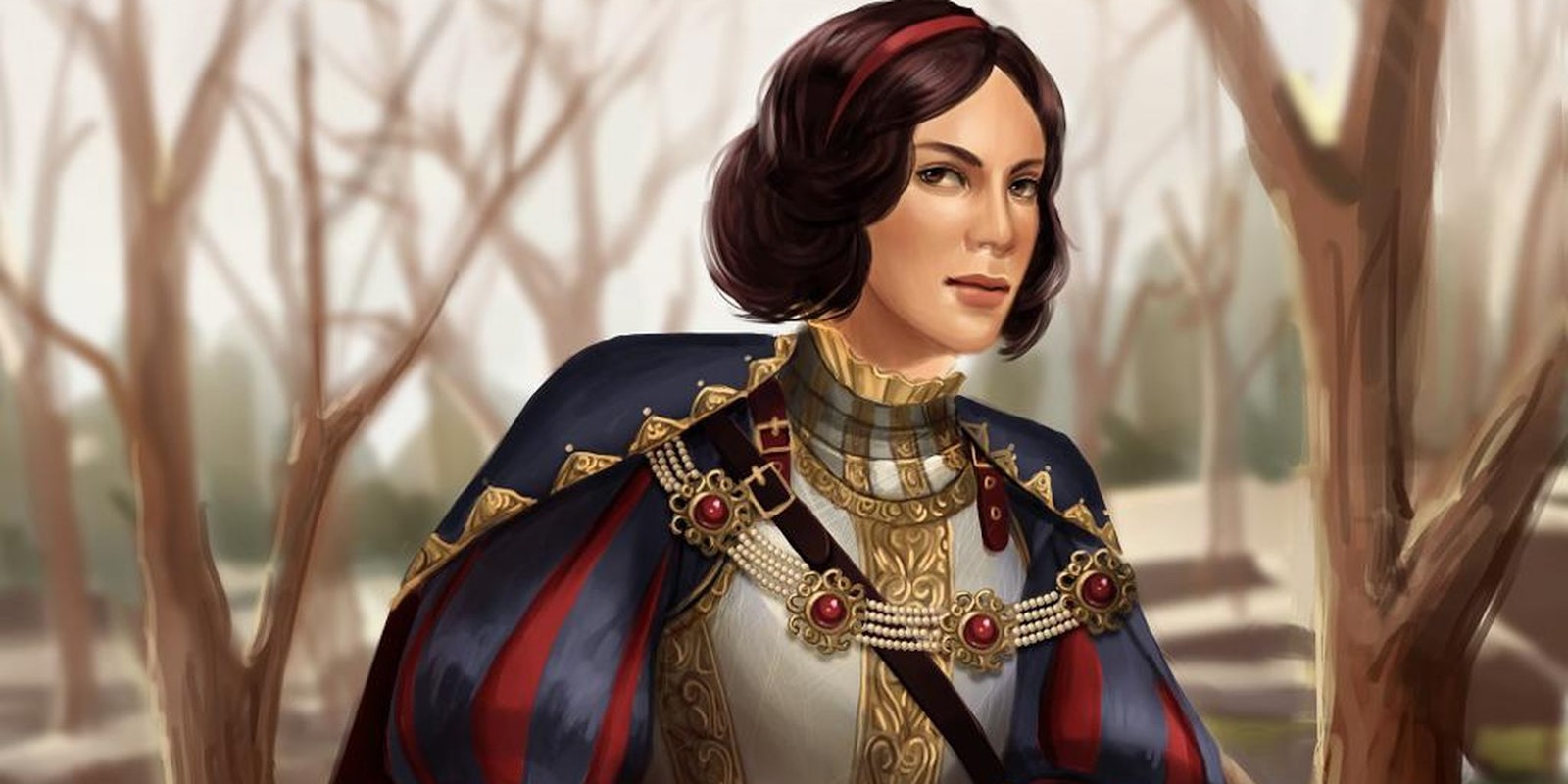If any consumer brand in America has truly aligned itself with innocence, purity, and warm fuzzy feelings, it’s Disney. But for every child who grows up surrounded by Disney products ranging from Broadway musicals to princess tiaras, there are countless controversies surrounding the content of Disney’s films, its notoriously cutthroat business practices, and the way the Mega-Mouse impacts culture—often negatively.
One of the most outspoken online proponents of a critical take on Disney is Feminist Disney, part of a growing Tumblr community of social justice bloggers and anti-fandom critique blogs. At Feminist Disney, which often functions like a “Yo, Is This Racist?” commentary blog, readers ask creator Mari Rogers to weigh in on everything from Disney’s notorious treatment of its employees to the blandness of its perpetually beautiful blonde princesses.
Before she began critiquing Disney regularly, Rogers was a women’s rights activist in college—one with a soft spot for princesses.
“At one point we were coloring in a Disney princess book for a ‘stress free meeting’ before finals,” she recalls about her collegiate feminist circle, “and I remember thinking how weird it was, that we were all feminists simultaneously enthralled and finding issues with Disney.”
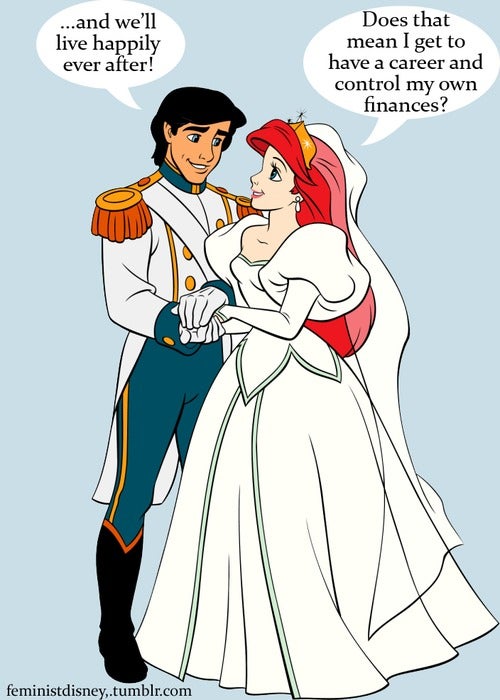
Photo via feministdisney
Anyone looking for issues will find plenty: Currently, controversy abounds over Disney’s whitewashing of The Lone Ranger‘s Tonto by casting Johnny Depp in the part. Last month, it was their makeover of Brave‘s heroine to make her appear more glamorous, older, and sexier, a move that’s arguably antithetical to the entire point of the movie she’s in. And, of course, the bland blonde princess tradition continues with the upcoming film Frozen, despite the frustration of the Disney fandom on Tumblr
Many people who grew up with Disney movies might not consider some of the inherent problems in Disney films until they’re confronted with these ideas on Tumblr or elsewhere, like the elements of rape culture and Stockholm Syndrome present in Beauty and the Beast, or how the classic Jungle Book is, as Rogers puts it, “a racist playground for man-creatures.”
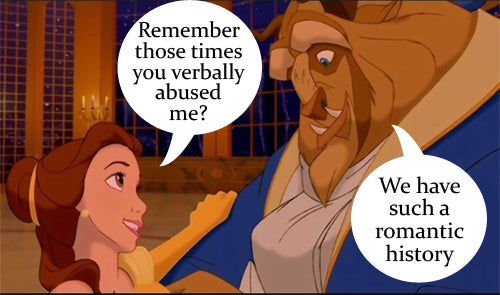
Photo via feministdisney
The Feminist Disney film review index reads like a catalog of failed potential: Even though movies like Nightmare Before Christmas and Lilo and Stitch get the thumbs up, the cultural and racial insensitivity of movies like Pocahontas loom large over the Disney canon.
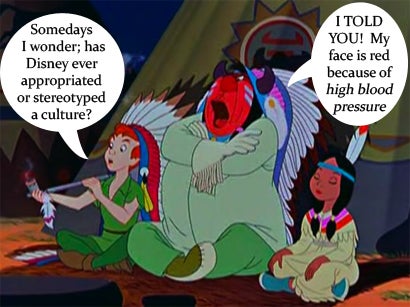
Photo via feministdisney
The aims of Feminist Disney are intersectional—that is, Rogers is just as likely to discuss a film in its relationship to other sociocultural issues as she is to focus on women. And sometimes the discussion veers off-topic, like when she discusses the way that gender issues in indie music go largely uncritiqued and unchallenged, compared to the same issues in rap music, or when she discusses “slutwalks.”
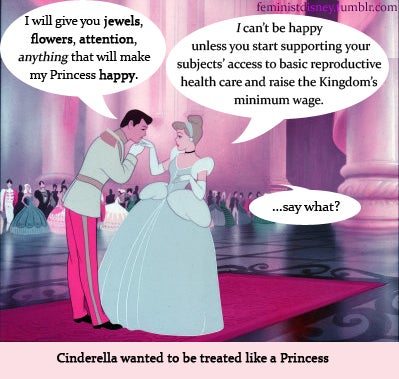
Photo via feministdisney
At times the blog has a “Yo, is this racist?” feel, as Rogers patiently explains to her readers why it’s not okay to call someone a “gypsy” and the difference between an offensive and inoffensive gay joke. “A lot of what I do started off based just on what people would ask about,” she says.
But above all, Feminist Disney is about the Mouse: the princesses, the live action films, the corporate policies, even the legislation. Newcomers to the blog might be surprised to learn that Disney has lobbied multiple times against paying its employees fairer wages for sick days and other forms of leave. But Rogers, who has spent ample time acting as an unofficial watchdog for the corporation’s actions, keeps a running tally of Disney’s offenses against its employees. Currently, she’s sounding the alarm about Disney’s silence regarding an alleged rape that took place during its College Program.
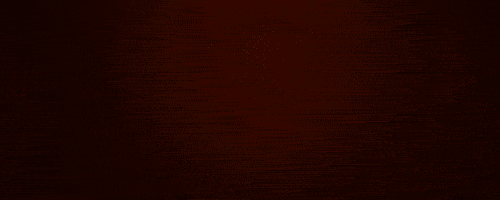
GIF by oliviawhen
Rogers’ blog is so active in the Disney Tumblr community that it’s hard to remember sometimes that she’s just only one person. But when we invited her to sound off about her favorite topics, she had much to say about the way Disney impacts us as individuals and as a culture—and the ways in which Disney fandom and the growing social justice movement is helping to combat the effects of a Disneyfied world.
What prompted you to start Feminist Disney, and why did you choose Tumblr as the place to have that conversation?
Disney is something I always liked examining, and I was disheartened by the lack of information available on feminist perspectives, both praise and criticism alike… [B]ig newspapers only had the same tired conversations (they still do) asking, “Is this princess a real feminist, finally?” ….
I moved from Xanga to Tumblr because I felt the format was more conducive to really having ongoing conversations. On other blog sites, you post things, and feedback sorta stops after a day. Tumblr posts inspire more back and forth.
Most people, when they think Disney, automatically think of Disney princesses. Is it hard to bring other Disney films into the discussion?
I wouldn’t say it’s hard, necessarily, because people definitely appreciate having discussions about a wider range of films. I would say people maybe have more interest or feel more passionate about the princesses because they are the most *visible* aspect of Disney? Which is legitimate, since the greater visibility, the greater the impact.
Racebending and other media activists have been outspoken about the racism inherent in casting Johnny Depp as Tonto in The Lone Ranger. Do you think the harmful effect of whitewashing that role is compounded because Disney’s name is attached to this production?
It’s incredible that Disney decided to engage in that level of racial stereotyping in a movie made for 2013… Once again, the native man has been commodified, and his actual skin has been made into a costume for children (literally, it’s a boys costume with sleeves meant to be his bare skin color). This to me is really part of what makes Disney’s involvement extra offensive….[N]ot only has [Depp] never identified as [a Native] before, but he has never lived as one, either. Reservation hopping/publicity shoots after production ends does not a Native make.
It’s a reminder that we still have a long way to go. Hopefully people are listening to all the unique Native voices whom, unlike Disney’s hand picked quotes, are NOT usually speaking up in favor of this movie.
Jasmine in Aladdin and Esmeralda in Hunchback of Notre Dame were both secondary characters in a film filled with boys, as well as ethnic woman who used sexual allure as a tool.
Oh yeah… it really bothers me how often people use pics of Jasmine from [the scene where she attempts to seduce Jafar] b/c she clearly was not happy with it and only did it because she had to (i.e., the producers thought she should). I think Esmeralda’s character was too big for Hunchback. Jasmine was a strong character and I think in many ways the story’s focus on Aladdin sort of makes us forget this. Even in her own movie, she was always the force behind her decisions. She went out seeking things—Aladdin didn’t start the movie coming to her.
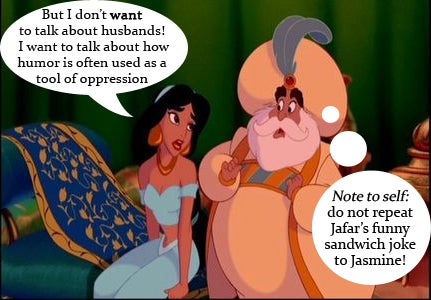
Photo via feministdisney
Disney was rumored to be swearing off making “princess films” after Tangled, but now has a new princess movie with Frozen. However, like Tangled, the title deliberately avoids referencing female heroines, and the new trailer is totally boy-centric. What are the reasons for this kind of image shift?
I think the reasons are pretty clear, considering that even Disney executives said that it was because they thought it would alienate boys from watching the movie?
I actually like the titles. It’s more reflective of current trends in marketing (to capture action or feeling rather than just bland descriptions, not the gender part). It’s aggravating that their obvious reasons for the title AND the associated trailers AND the greater weight given to the development of male characters all relates back to seeing the stories of girls as being “not enough,” however.
An earlier post of mine sums things up well:
It’s a problem in and of itself to have this attitude in marketing since the way products are marketed shapes how we view them…and also a problem because a similar strategy is never seen as important for women—indicating that:
A) The concept is faulty (so long as you have a good story line, it’s clear that children of any gender identity will enjoy it, and no one had to call the Lion King “Pride Rock” in order to have girls like it too),
B) Boys are seen as the more important marketing demographic since no similar change has ever been made/seen as necessary to make to interest female audiences
and
C) It sends a pretty clear point that boys and girls are so different they cannot possibly like even seeing each other as a character without the other gender present nearby—even at the young ages of 4-11 years old, before they even reach puberty. This is a dangerous message to send children for it reinforces the rigidity of the gender binary divide.
When Brave came out a lot of the discussion about how we “needed” a Merida-like heroine overlooked the fact that we already had one in Mulan. Do you think that tendency is down to simple racism or are there other contributing factors like Disney’s own marketing of the princess line?
For sure. You might be aware of the petition… for Disney to not use the Merida redesign? One reason I did not participate as much in forwarding it as I would have was because exactly what you point out. The very wording of that petition implied she was the “first” girl to be a hero and save herself. If they had said the first princess without a romantic interest, that would have been correct. But it was completely erasing Mulan in favor of a “real” princess… I think people see white princesses as being “more important” to showcase bravery, courage and independence. Subconsciously, of course. No one intends to slight Mulan, but it happens all the same.
Has the social justice community on Tumblr made it easier or harder for you to have discussions about problems in Disney films?
I think the social justice commentary on Tumblr is great, in spite of the flack it gets. It’s made me think a lot deeper about things, and I actually reply less flippantly about issues as I did in the beginning, because quick feedback taught me that looking over what I write for accuracy is important. It keeps me on my toes—in a good way. And they’ve also been incredible with providing me with sources and links to things I wouldn’t think of even looking into.
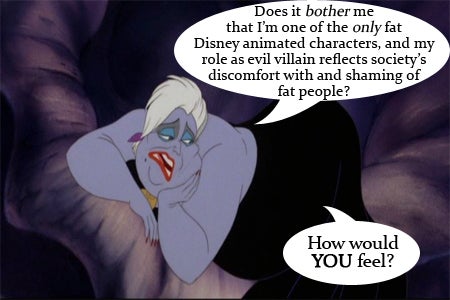
Photo via feministdisney
In The Mouse That Roared, Henry Giroux calls Disney “a teaching machine,” and states that “Among multimedia corporations, Disney appears one of the least daunted in attempting to dominate public discourse.” Is there one Disney film or product that encapsulates all the things wrong with Disney’s flawed model of consumerism married to cultural propaganda?
Pocahontas. They not only completely tore down (and really grossly misrepresented in many ways) the actual history as well as the culture of the Powhatan tribe, but they then commodified it in shirts, costumes, and toys, all for kids way too little to understand the impact of what they were participating in. There are several sources that site Pocahontas as a leading originator of the new native stereotype, the “magical nature native” that replaced the more dated stereotype of the “unintelligent savage.”
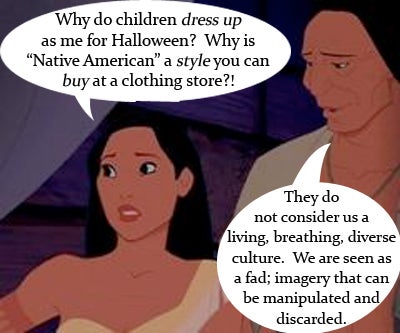
Photo via feministdisney
Why do you think it’s so hard for narratives about women to escape harmful tropes: the “hooker with a heart of gold,” the manic pixie dreamgirl, the princess?
Ultimately a lot of these particular tropes view women specifically through the lens of a male protagonist: the pixie dreamgirl, for example, [is sometimes] literally is shown to not exist before she steps into that role. Sexism also turns women against each other in self-policing. We’re taught to see the world this way, so we accept these “stories” as truth rather than fable.
…Even when we get storylines that deviate from the norm, we try and cut it down to tired tropes we understand. One example of this would be the Emperor Kuzco… The fandom took what was a character who didn’t fit gender binaries or stereotypes and they re-identified him *in order* to fit the stereotypes! It would be great to have a gay emperor or a guy who identifies as a princess, but he did neither of these things. Instead, because he did not fit the image audiences expected of a masculine man, he is called a “princess,” “gay,” and “a lesbian,” alternatively and people think this is progressive.
Between The Lone Ranger and Frozen, things look pretty grim for Disney and girls, but have you seen any signs that the studio is changing for the better?
Honestly… no? Some intelligent people have pointed out before me that progress is not always forward and it is unwise to put our eggs in that basket. I honestly think Disney has largely stalled out for the past decade…I will also say that Disney, as a company, is not magic. It has created great things, and has some great people working for it, but you need to be consumer savvy like with anything.
Do you feel like the online discourse about Disney will ever create a shift in awareness among Disney filmmakers and the studio itself?
I think online discourse is already creating a shift in awareness. It will never hit everyone, but you do not need a majority of people to make change, which is something I try to keep in mind. Although it’s impossible to say, I do think some changes Disney has made recently were, without a doubt, a reflection of online discussion (such as the retraction of the VERY whitewashed Mulan re-design to a less blatant version). It’s just a small start, but it is that: a start.… And if I can’t influence Disney now, I can influence the Disney of tomorrow. I’ve already had a lot of Disney hopefuls who are just entering the media industry now, saying that they hope they can incorporate what they’ve read on my blog and elsewhere into their ventures. I think many of them will eventually do more than I could even dream of right now.
Photo via repairherarmor/Tumblr

